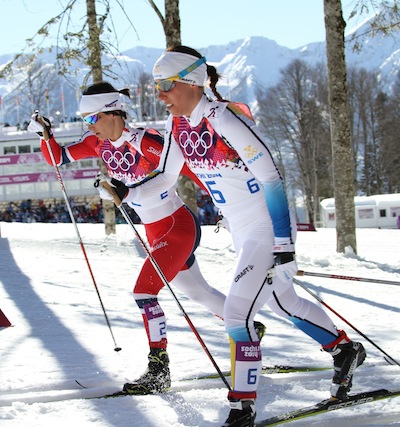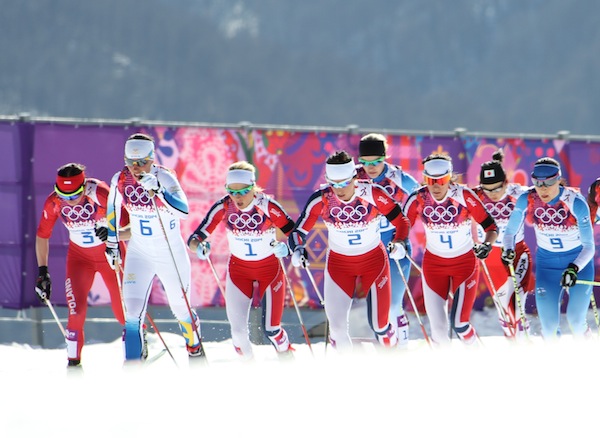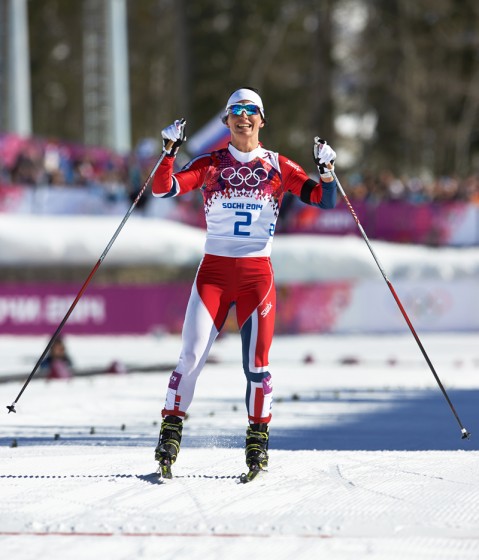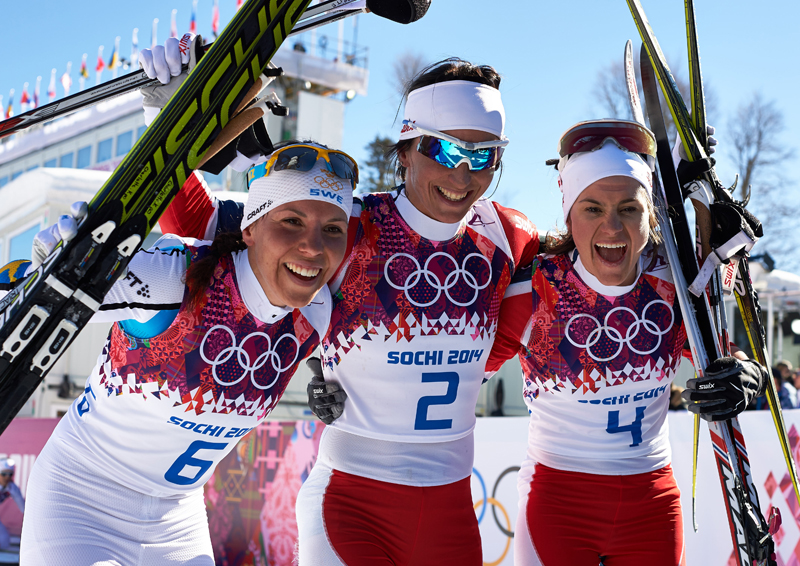
FasterSkier’s coverage is made possible through the generous support of Rudy Project.
SOCHI, Russia — On the eve of the Olympics, the night of the Opening Ceremony, the air of excitement and anticipation among the Norwegian cross-country team was wiped out by the death of Astrid Uhrenholdt Jacobsen’s younger brother, Sten Anders.
It wasn’t the leadup anyone could have foreseen or prepared for, and the news came Friday night. His passing was sudden and unexpected, according to a Norwegian team press release. There was no need to elaborate; he was gone.
Jacobsen’s teammates immediately rallied around her, comforting the current World Cup runner-up and taking the brunt of questions surrounding the situation. She would not race until at least next Thursday, if at all, and several of her teammates had a skiathlon to focus on the following afternoon.
Jacobsen, 26, asked them to race for her family and her brother. They delivered, putting three in the top four of Saturday’s 15-kilometer skiathlon — the first nordic race of the 2014 Winter Games.

“My wonderful girls. You are my strength, through thick and thin,” Jacobsen tweeted during Saturday’s race. “Thank you … Eternally grateful, if there are medals or not.”
Marit Bjørgen ultimately topped the podium with a 1.8-second win over Sweden’s Charlotte Kalla, and two more Norwegian skiers, Heidi Weng and Therese Johaug, placed third and fourth, respectively.
The gold medal was Bjørgen’s fourth, making her the most successful Norwegian woman at a Summer or Winter Olympics, besting the record of three-time Olympic champion figure skater Sonja Henie.
“Yesterday was very hard day,” Bjørgen said in a post-race press conference. “And yeah, sport is sport, [but] when something like this happens, it was hard to have focus on the race yesterday evening. … It’s emotional of course, but Astrid wanted us to do this today, and we did it for her, her family and her brother.”
“I have not had many hours of sleep a night,” Johaug told Norway’s TV 2. “It is very unreal. It’s almost like it has not occurred to me.”
Johaug and Bjørgen took charge from the start, leading after the first climb out of the stadium on the first of four laps. Poland’s Justyna Kowalczyk was right there with them, along with Weng.
Striding carefully on an intensely sunny afternoon with temperatures in the mid-40s, Bjørgen and Kalla skied alongside each other almost uniformly at the front up a long climb before the lap lanes. United in their desire to win, they were also trying to shake off the weight of Friday’s news.
This wasn’t about a Bjørgen-Kowalczyk showdown, or about Kalla achieving an Olympic podium for Sweden, four years after teammate Anna Haag won silver in the skiathlon at the Vancouver Games. This race was for Sten Anders, a lawyer and Jacobsen’s training partner, a man who was once deeply connected to the team and opinionated on the topic of education in skiing.
Kalla heard about the incident Saturday morning before the race.
“I didn’t know anything before I entered the wax cabin today, so it was a lot of feelings because they are good friends to me,” she said at the press conference. “I didn’t know how to handle it. I just tried to keep focused on the race because that’s what we have to do and think about this to get perspective what an Olympic medal is worth. If they want to talk, I will be there for them for sure.”
Bjørgen, Johaug and Kalla traded leads throughout the classic and skate portions of the race, and Kowalczyk didn’t end up being a factor. Hanging in the top five with Finland’s Aino-Kaisa Saarinen, who latched onto the group on the second lap, Kowalczyk entered the stadium in sixth before the transition.
Two seconds behind Bjørgen, who was first through the pit stop followed by Johaug, Kalla, Weng and Saarinen, Kowalczyk in sixth stumbled when switching to her skate skis, and the misstep cost her.
Johaug took the lead early on the skate loop, leading the long descent and enduring grind back up toward the stadium. With one lap to go, the five-skier pack with Johaug, Saarinen, Weng, Bjørgen, and Kalla remained within a second of one another.
Finland’s Kertu Niskanen chased Kowalczyk up the final climb, but couldn’t quite catch her. Kowalczyk came through the stadium nearly 15 seconds behind in sixth, a deficit she wouldn’t be able to make up over the next 3.75 k.
Meanwhile, Kalla jetted to the front before the final climb, passing Bjørgen and putting 10 to 15 meters into her. Bjørgen immediately reacted, reining Kalla back in up the final hill then taking the inside lane and pushing past her on the sweeping downhill into the stadium.
Out of steam and a draft to match, Kalla lost contact, and Bjørgen skied away to the 1.8-second win in 38:33.6.
“I only tried to focus on the highest point [of the hill] and give everything I had to that point,” Kalla said. “I knew I had some time to recover on the downhill because I had some tired legs.”
On the last curve before the finish, she realized she wasn’t going to catch the defending Olympic skiathlon champion.
“I was really tired and I had to keep focused where I had my skis and my poles so it was hard to get a high speed,” Kalla said.

For Bjørgen, winning another gold — regardless of what number it was — “incredible.”
“I had a very good feeling today, and my skis were so perfect,” she said. “I haven’t [thought] about how many medals I have won because I’m still competing. I have to leave the races behind me and look forward. I will think about how many medals I have after I stop skiing.”
After acknowledging that she’s a favorite in every race at the 2014 Olympics, Bjørgen reiterated that she intends to race all six events. But her objective all along was a single gold.
“I have reached my goal in this Olympics and I can relax enjoy the rest of it,” she said.
Nearly 12 seconds behind Kalla in second, Weng, Johaug and Saarinen contested for the bronze, with Weng getting the edge over Johaug by 1.4 seconds. Saarinen placed fifth, another 0.7 seconds back. Kowalczyk held her position for sixth, 56.1 seconds behind Bjørgen.
“I promised [Astrid] I’d go fast; it helped,” Weng said. “It’s my first Olympic Games and to medal [in the first race] is a nice thing.”
Niskanen finished seventh (+1:01.7), and Jessie Diggins was 30 seconds behind in eighth, tying the best-ever finish by an American woman at the Olympics (set by Kikkan Randall in the 2010 Games). Two seconds later, Sweden’s Emma Wiken notched ninth, and Japan’s Masako Ishida placed 10th, another second back.
Less than 1 1/2 seconds outside the top 10, Liz Stephen placed 12th for the U.S. for her best Olympic result by 37 places in her second Olympics. Eva Vrabcova-Nyvltova of the Czech Republic finished 0.8 seconds ahead in 11th (+1:35.2).

Alex Kochon
Alex Kochon (alexkochon@gmail.com) is a former FasterSkier editor and roving reporter who never really lost touch with the nordic scene. A freelance writer, editor, and outdoor-loving mom of two, she lives in northeastern New York and enjoys adventuring in the Adirondacks. She shares her passion for sports and recreation as the co-founder of "Ride On! Mountain Bike Trail Guide" and a sales and content contributor at Curated.com. When she's not skiing or chasing her kids around, Alex assists authors as a production and marketing coordinator for iPub Global Connection.




2 comments
John Forrest Tomlinson
February 8, 2014 at 6:08 pm
Great to see a real, sharp attack work in creating separation – nice move by Kalla.
shreddir
February 8, 2014 at 9:07 pm
I hope the Norwegian nation can help Astrid Jacobsen with the incredible emotional pain she is experiencing to where she will want to be available for the 4×5 relay. Kristen Steira has lost a lot of pace so they really need a replacement for either the second classic leg or the third skate leg. Ingvild Flugstad and Maiken Falla are more suited for the sprints right now. New girl Harsem is not fast enough and lacks experience at this level. Too bad the selectors couldn’t find a way to bring Heidi Weng”s cousin and sidekick, Martine Ek Hagen to Sochi especially after she was the distance golden girl at U23 Worlds 2 weeks ago.